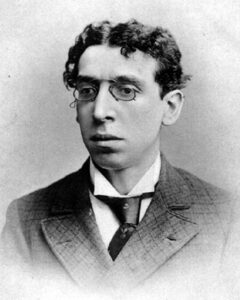
Israel Zangwill (January 21, 1863-August 1, 1926) was the son of Moses Langwill and his wife Ellen Hannah Marks, immigrants to England from today’s Latvia and Poland respectively. A journalist and playwright, he was nicknamed “The Dickens of the Ghetto.”
His play “The Melting Pot” was credited with penning that phrase to describe absorption of immigrants in the United States. After seeing it, former President Theodore Roosevelt reportedly leaned out from his theater box and shouted, “That’s a great play, Mr. Zangwill. That’s a great play.” It dealt with a Russian Jew whose family was wiped out in a pogrom and after immigrating to America, he falls in love with a Russian Christian, whose father was responsible for the pogrom. The couple shared a kiss as the curtain fell.
Besides plays, he wrote mysteries such as The Big Bow Mystery, social satires such as The King of the Schnorrers, and essays on famous Jews, among them Baruch Spinoza, Heinrich Heine, and Ferdinand Lassalle. In Jewish politics, he agreed with Theodor Herzl that Jews needed a land of their own, but disagreed that it had to be in Palestine. He said the Jewish state should be wherever sufficient land was available.
Before his split with Herzl, Zangwill popularized the phrase “a land without people for a people without a land” but Alexander Keith and Lord Shaftesbury had voiced similar sentiments before he did. Zangwill also is credited with saying that Jews “can make the wilderness blossom as the rose.”
Zangwill married the feminist author Edith Ayrton in 1903, whose stepmother Hertha Ayrton was Jewish. They lived in Sussex with a daughter and two sons, the younger of whom, Oliver Zangwill, made a name for himself as a psychologist.
Tomorrow, January 22: Piper Laurie
*
SDJW condensation of a Wikipedia article